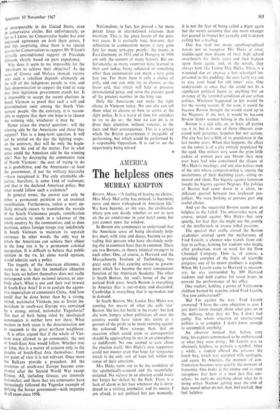The helpless ones
AMERICA MURRAY KEMPTON
Boston, Mass.—'A feeling of having no choice,' Miss Mary McCarthy has noticed, 'is becoming more and more widespread in American life.' We have become, as she says, the civilisation where you can decide whether or not to turn on the air conditioner in your hotel room, but you cannot open the window.
In Boston one commences to understand that the American sense of being absolutely help- less must, with time and decay, become so per- vading that persons who have absolutely noth- ing else in common have that in common. There are two Bostons, in theory inimical strangers to each other. One, of course, is Harvard and the Massachusetts Institute of Technology, two great seats of that catering service to govern- ment which has become the most conspicuous function of the American Academy. The other is South Boston, the soul's home of the un- noticed Irish poor. South Boston is everything in America that is out-of-date and discarded; Cambridge is everything that is up-to-date and in demand.
In South Boston, Mrs Louise Day Hicks was running for mayor of what she calls 'our' Boston. She lost her battle in the event : but had she won, hungry urban politicians all over the country would have taken this event as a portent of the profit to be made running against the coloured. How strange, then, that an occasion which could seem so consequential should be approaching its test in an atmosphere so indifferent. No one seemed to care about the election itself; Mrs Hicks's own supporters could not muster even that hope for vengeance which is the only sort of hope left within the range of their emotions.
Mrs Hicks turns out to be the candidate of the apathetically-aroused and the resentfully- resigned. No victory in an election could make her forget her defeat by the flesh. There is a look of alarm in her face whenever she is intro- duced to a visiting journalist; and its source, I am afraid, is not political but just womanly; it is not the fear of being called a bigot again but the weary certainty that one more stranger has paused to inspect her casually and to depart calling her a haybag.
One has read too many autobiographical novels not to recognise Mrs Hicks at once; middle-aged men dream of their high school sweethearts for thirty years and then happen upon them again; and, in the novels, they always look like Louise Day Hicks. There is a wounded doe or anyway a lost schoolgirl im- prisoned in this pudding; the eyes fairly cry out to stay your hand for old times' sake. One understands at once that she could not be a significant political figure as anything but an instance of the terminal condition of our urban politics. Whatever happened to her would be for the wrong reason. If she won, it would be because Boston thought she would stand up to the Negroes; if she lost, it would be because Boston thinks women belong in the kitchen.
Boston is a sick city, or, at least, all parties say it is; but it is one of those illnesses asso- ciated with geriatrics, hopeless but not serious. The city has lost a fifth of its population in the last twenty years. When that happens, the effect on the senses is of a city entirely populated by the aged. One notices very soon the grim little cadres of women past any bloom they may ever have had who constituted the claque at Mrs Hicks's meetings; and one also notices men of the sort whose companionship is among the misfortunes of their declining years, sitting re- moved and silent. The bigotry against feminism fought the bigotry against Negroes. The politics of Boston had come down to a silent, in- different -quarrel between two irrelevent pre- judices. We were .looking at persons past any useful choice.
And yet the successful Boston seems just as helpless as the failed. The universities were, of course, united against Mrs Hicks—but very quietly, for fear that she might use the enmity of the intellectuals to arouse tribal passions.
The quarrel that really stirred the Boston academies centred upon the misfortunes of Fred Leavitt, a chemist who travels from col- lege to college, looking for students who might, after graduation, want to work for the Dow Chemical Company. Dow is, of course, a sprawling complex of the fruits of scientific progress; one of its minor products is napalm. When Mr Leavitt came to Harvard as mission- ary, he was surrounded by 300 Harvard students and held captive for seven hours to prevent the performance of his office.
One student, holding a poster of Vietnamese children burned by napalm, asked Fred Leavitt, 'Are you embarrassed?'
'But I'm against the war,' Fred Leavitt answered. 'I have the same objection as you. I just don't know enough about what goes on in the military, what they do. No, I don't feel guilty. The whole situation of international politics is so complex. I don't know enough to accomplish anything.'
An observer noticed that, before very long, his captors commenced to be embarrassed at what they were doing : Mr Leavitt was so obviously helpless, so pathetic a symbol. After a while, a student offered the prisoner his lunch bag, which was accepted with apologies, and eaten. In America, the moment of con- frontation becomes very quickly the moment of fraternity. One looks at the enemy and at once recognises that here is a man just like our- selves: he can't do anything about what he is doing either: Nations getting near the end of their moral tether do not, then, feel.wicked; they feel helpless.






































 Previous page
Previous page